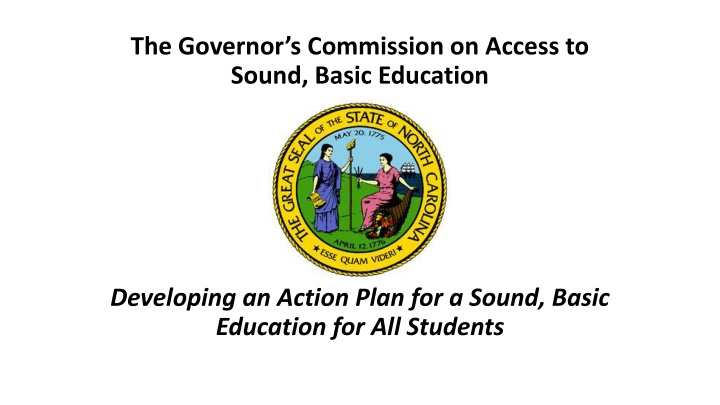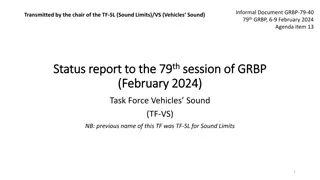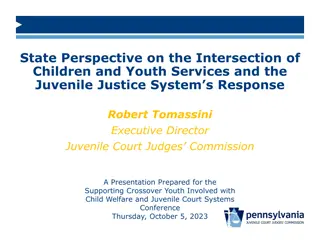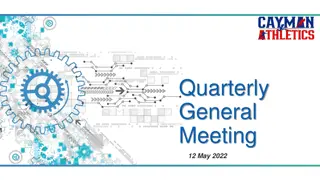Governor's Commission on Access to Sound Basic Education
The Governor's Commission on Access to Sound, Basic Education is working to develop an action plan to ensure all students have equal access to quality education in North Carolina. The commission was established in response to the Leandro v. State of NC lawsuit, which highlighted the need for resources to provide a sound, basic education for every child. Governor Cooper's initiative aims to meet the state's constitutional obligation and address educational disparities. The commission's work focuses on key areas such as early childhood education, teacher training, principal support, assessments, and financial resources. By collaborating with experts and stakeholders, the commission seeks to lay the foundation for a comprehensive plan to improve education across the state.
Download Presentation

Please find below an Image/Link to download the presentation.
The content on the website is provided AS IS for your information and personal use only. It may not be sold, licensed, or shared on other websites without obtaining consent from the author.If you encounter any issues during the download, it is possible that the publisher has removed the file from their server.
You are allowed to download the files provided on this website for personal or commercial use, subject to the condition that they are used lawfully. All files are the property of their respective owners.
The content on the website is provided AS IS for your information and personal use only. It may not be sold, licensed, or shared on other websites without obtaining consent from the author.
E N D
Presentation Transcript
The Governors Commission on Access to Sound, Basic Education Developing an Action Plan for a Sound, Basic Education for All Students
Leandro v. State of NC Lawsuit filed in 1994 by five low-wealth school districts (Hoke, Halifax, Robeson, Vance and Cumberland) Suit claimed that districts did not have enough money to provide an equal education to their students NC Supreme Court ruled in 1997 that state s students have a constitutional right to a sound, basic education In 2004, Judge Howard Manning ruled that to meet its constitutional duty, the state must Staff each classroom with a competent, well-trained teacher Staff each school with a competent, well-trained principal Identify the resources necessary to ensure that all children, including those at-risk, have an equal opportunity to obtain a sound, basic education
Why Now? In 2017, Governor Cooper joined with the Leandro plaintiffs to work together on a plan for meeting the state s constitutional obligation Governor Cooper created the Commission on Access to Sound Basic Education through Executive Order 10 https://governor.nc.gov/issues/education/commission-access-sound-basic- education Judge David Lee appointed an independent consultant to the court (WestEd) The Commission and WestEd have worked to bring forward the most current expertise and research
Why Now? WestEd filed its final report with the court in December 2019, and the report was made public Commission has draft recommendations that it is currently finalizing Parties in the case are drafting a joint consent order(s) outlining actions the state should take for Judge Lee s consideration this fall Consent order will be based on West Ed and the Commission s findings We have a unique opportunity now to meet NC s constitutional obligation, which the court has said begins before age five
Commissions Work Work groups from the Commission have crafted draft priorities for action around five key areas: Early childhood / whole child Teachers Principals Assessments and accountability Finance and resources Today s focus is on the early childhood/whole child priorities for children birth through 3rd grade. These priorities build on and align with current work in NC, including the NC Early Childhood Action Plan, NC Pathways to Grade-Level Reading, others.
Early Childhood/ Whole Child Build the early childhood educator pipeline for birth through 3rd grade Scale up Smart Start to provide early childhood system infrastructure and a continuum of services for children and families from birth to age five Expand access to early intervention Scale up the NC Pre-K Program to serve all eligible at-risk four-year-olds Ensure that elementary schools are ready to meet the needs of all children in the early grades Improve cross-sector early childhood data quality, collection, analysis, and use for data-based decision making
Build the early childhood educator pipeline for birth through 3rd grade Develop a salary and benefits scale and strategies for improving compensation for the birth to age five workforce. Provide salary parity with public school educators with comparable qualifications. Enhance early childhood program funding rates to support the workforce Increase funding for Child Care WAGE$ and Infant-Toddler Educator AWARD$ wage supplement programs Provide professional development that is aligned for the birth through 3rd grade educator workforce
Scale up Smart Start to provide early childhood system infrastructure and a continuum of services for children and families from birth to age five Increase state funding for Smart Start that will: Address a greater percentage of community need Expand a range of family support strategies, reaching children as young as possible when impact is greatest Expand developmental screenings Support high-quality early education programs Allow community-level flexibility in funding to meet the greatest community needs and build capacity to manage multiple public and private funding sources
Expand access to early intervention Expand eligibility for the IDEA Part C Early Intervention Program for infants and toddlers to reach more who are at-risk for developmental delay Strengthen early intervention capacity and infrastructure at the state and local levels Expand infant/early childhood mental health services IDEA Individuals with Disabilities Education Act
Scale up the NC Pre-K Program to serve all eligible at-risk four-year- olds Increase state funding to serve all at-risk four-year-olds Implement strategies to ensure equity of access in communities of color and in communities whose first language is not English Increase state funding to increase rates to support the true cost of providing NC Pre-K Rates should factor in the cost of teacher salaries/benefits with parity to public school teachers, transportation, quality improvements, and child find Continue to maximize the public-private mixed delivery system Ensure access to full day and full year programs to meet family needs and prevent summer learning loss
Ensure that elementary schools are ready to meet the needs of all children in the early grades Support effective transitions for young children from birth to age 5 programs into elementary schools that are ready for ALL children Ensure high-quality elementary principals and teachers, trained in early learning Expand instructional assistants in K-3 Expand student access to school psychologists, nurses, counselors, and social workers Ensure capacity for evidence-based teaching of early reading Ensure effective support for children with unique needs
Improve cross-sector early childhood data quality, collection, analysis and use across the state and build a culture of continuous quality improvement to support data-based decision making Support a NC Early Childhood Data Advisory Council Improve data collection for measures prioritized in the NC Early Childhood Action Plan and the NC Pathways to Grade-Level Reading. Use data to focus on equity and target services. Connect data systems for birth to age five programs to data systems for public schools for more effective alignment and transitions
Additional Information Commission s website: https://governor.nc.gov/issues/education/commission- access-sound-basic-education























